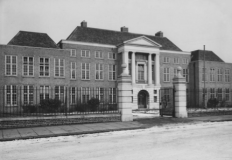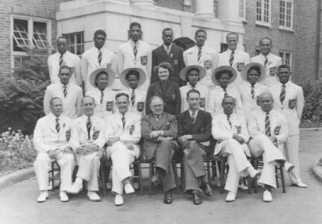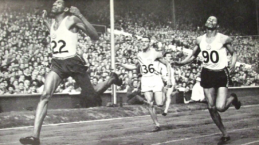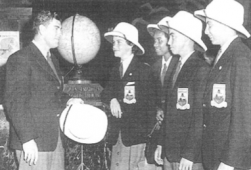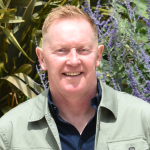When Wembley hosted the Olympic Games in 1948 the country was still recovering from the Second World War. There was no money to build an athletes’ village, and most of the 4,100 competitors from 59 nations were housed in RAF camps, colleges and schools around London. Wembley County School in Stanley Avenue (now part of Alperton Community School) was one of them.
As soon as the school broke up for its summer holidays, teams from the Ministry of Works moved in. Most of the upstairs classrooms were converted into dormitories, with a bed and half- share of a wardrobe for each of more than sixty athletes and team officials who would be staying there. Other classrooms downstairs were turned into a competitors’ lounge (with armchairs, radio set and piano) and an indoor sports room (including table tennis and darts).
These and the dining hall were decorated with colourful curtains, and with vases of flowers donated by local residents from their gardens at the request of Wembley’s Mayor.
A week later, on the evening of Friday 23 July, the school welcomed the men’s teams from seven small Commonwealth countries – Bermuda, British Guiana (now Guyana), Ceylon (now Sri Lanka), Jamaica, Malta, Singapore and Trinidad. Throughout their stay the flags of each nation flew from dawn to dusk outside the school building, in a semi-circle of poles around the Olympic flag on the school’s main flagpole. The Jamaican Olympic Team outside the school building, July 1948 can be seen on the right.
Life at this Olympic Games Centre was soon into its routine. Breakfast was served at 7.30am, and from then until lunch at 12.30pm the athletes would be training at various centres or, after the Games opened on 29 July, taking part in heats at Wembley Stadium or the Empire Pool. Wembley County School’s gymnasium was the main training centre for competitors in the boxing, wrestling and weight-lifting events. There would be further training until the evening, when dinner was served between 6.30 and 8pm. Although local people were still having to put up with strict food rationing, competitors were allowed special rations, and the teams had brought most of their own food supplies with them.
Despite the small contingents, athletes staying at the school met with great success. Duncan White of Ceylon was second in the 400m hurdles final, having equalled the world record in the semi-finals. Rodney Wilkes of Trindad also won a silver medal in his weight-lifting division. The school’s biggest celebration came after the 400 metres final, which saw the Jamaican pair of Arthur Wint and Herb McKenley winning the gold and silver medals. Arthur Wint, who also came second in the 800 metres, was 28 years old, and had left Jamaica to train as a volunteer pilot during the Second World War. After five years in the RAF, he had just finished his first year as a medical student at St. Bartholomew’s Hospital when he came to Wembley to compete for his country in the Olympics.
Some female competitors from these countries stayed with two of the school’s pupils. Denise Verrinder’s family looked after the entire Bermudian women’s team of two sprinters, plus the team manager’s wife as their chaperone, at their home in Stanley Avenue. The ladies’ first accommodation in Earl’s Court had been too noisy, so they asked if the school could find somewhere suitable for them, close to the rest of the team. Mr and Mrs Verrinder gave up their large bedroom, next to the family’s bathroom, for their guests. Denise remembered how friendly the athletes were, and their thrill at seeing the Royal Family at a reception at Buckingham Palace and at listening to Big Ben strike in Westminster, something they had heard so often on the radio at home. They even let Denise and her sister, Valerie, wear their blazers one day, and walk down the road pretending to be athletes!
The Welson family welcomed three Jamaican athletes into their house in Scarle Road – Mavis a hurdler, Carmen a high-jumper and Kathleen who was sixth in the long jump final as well as competing in the 100 and 200 metres. Jennifer Welson learned that they were part of the first ever Jamaican Olympic team, paid for by public subscription, and that they had travelled for twenty-four days on a banana boat to get here. As they came from a tropical country, she was surprised that they found the summer heat in Wembley unbearable! They were used to a cool breeze off of the sea at home. Like the men’s teams at the school, the Jamaican women brought much of their own food with them, and a new dish was introduced into Jennifer’s home, boiled rice with grated coconut and red beans. Their guests also shared pineapples with the family, a rare treat when food in Britain was tightly rationed.
Wembley’s Olympic Games in 1948 were a “make-do” affair, although with the community’s help they turned out to be a great success. The athletes at London 2012 may have a comfortable village, but they will miss the contact with local people which their forerunners in 1948 enjoyed.
-
-
- 1922 – Stanley Avenue opened – previously a mansion
- 1928 – adopted the name Wembley County Grammar School
- 1938 – original mansion demolished to allow for a new appropriate site to be built
- 1948 – separate school on Ealing Road named Alperton County Mixed School
- 1957 – School split into Alperton Boys and Alperton Girls
- 1967 – 3 schools amalgamated to form Alperton High School
- 1991 – renamed Alperton Community School
-
London Olympics 1948
-
-
- London Olympics 1948 – first time in 12 years since Berlin 1936
- Known as the austerity games due to the economic climate and post war rationing
- No new venues were built, with events taking place mainly in Wembley Stadium
- Instead of an Olympic village, athletes were house in existing accommodation in Wembley
- 59 Nations, 4104 athletes, 3714 men, 390 women and 19 disciplines
- Germany and Japan were refused permission to attend, though invited, the USSR did not attend
- USA won the most medals
- Stanley Avenue site – after summer term most of the upstairs classrooms were converted into dormitories
- Other classrooms downstairs were turned into a competitors lounge and an indoor sports room
- These and the dining hall were decorated with colourful curtains with vases of flowers donated by local residents from their gardens
- The school welcomed teams from 7 small Commonwealth Countries
- Some female competitors from these countries stayed with two of the school’s pupils
- Wembley’s 1948 Olympics were a “make-do” affair but was a great success
-
Bob Marley and Johnny Nash performance (1972)
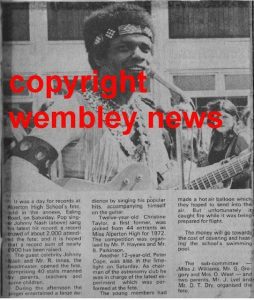 In 1972, after returning from a tour of New York, Jamaica's most popular stage band, Bob Marley and the Wailers, begin a tour in England with Johnny Nash. After appearing at different venues in London, including Wembley Stadium and Alexandra Palace, Bob Marley and Johnny Nash perform at Alperton High School on 22 July 1972, a memorable event covered by the local press.
In 1972, after returning from a tour of New York, Jamaica's most popular stage band, Bob Marley and the Wailers, begin a tour in England with Johnny Nash. After appearing at different venues in London, including Wembley Stadium and Alexandra Palace, Bob Marley and Johnny Nash perform at Alperton High School on 22 July 1972, a memorable event covered by the local press.
Alperton Archives
You can find out more about the Alperton Olympic Village and Wembley’s Pop Music history from the archived documents below sourced by Philip Grant from the Wembley History Society Collection.

Ron Greenwood (1921-2006)
Ron Greenwood was an English football player and manager, best known for being manager of the English national football team from 1977 until 1982, as well as being manager of West Ham United for 13 years, a time during which the club gained much of its fame. That of England manager was his final role in football. Read more about him in the Guardian.

James Saunders (1925 - 2004)
James Saunders was an English playwright. After a career in teaching, he became a full-time playwright in 1964. He was associated for a number of years with the Questors Theatre in Ealing, from 1972, he worked with Sam Walters' Orange Tree Theatre in Richmond, Surrey. For more information about James Saunders click here.
 Keith Moon (1946 - 1978)
Keith Moon (1946 - 1978)
Keith Moon was an English musician best known as the drummer of the English rock group The Who. He was noted for his unique drumming style. In 2011, Moon was voted the second-greatest drummer in history by a Rolling Stone readers' poll.Thirty-five years after his death, his drumming is still praised by critics and musicians.
Nicholas Hopkins (1944 - 1994)
Nicholas "Nickie" Hopkins recorded and performed on many notable British and American pop and rock music releases from the 1960s through the 1990s including many Rolling Stones songs. From Alperton he went onto win a scholarship at Royal Academy of Music, London.
Gary Waddock
Gary is a former professional footballer. He is assistant head coach of Cambridge United. He formerly managed Queens Park Rangers, Aldershot Town, Wycombe Wanderers and Oxford United, and has previously worked at MK Dons as Head of Coaching and Portsmouth as assistant and caretaker manager. He grew up in Alperton and attended Alperton community School from 1973 to 1978.

